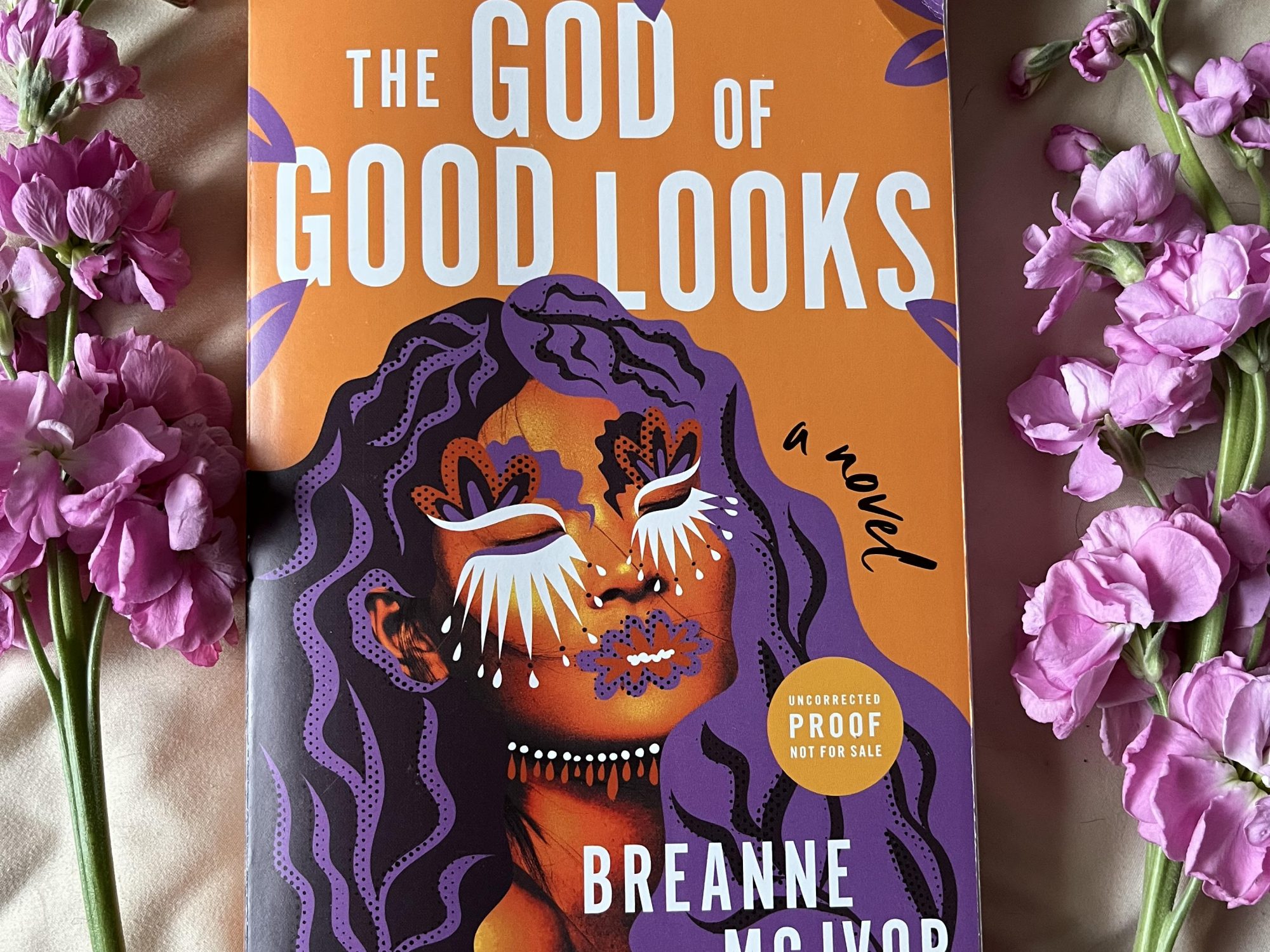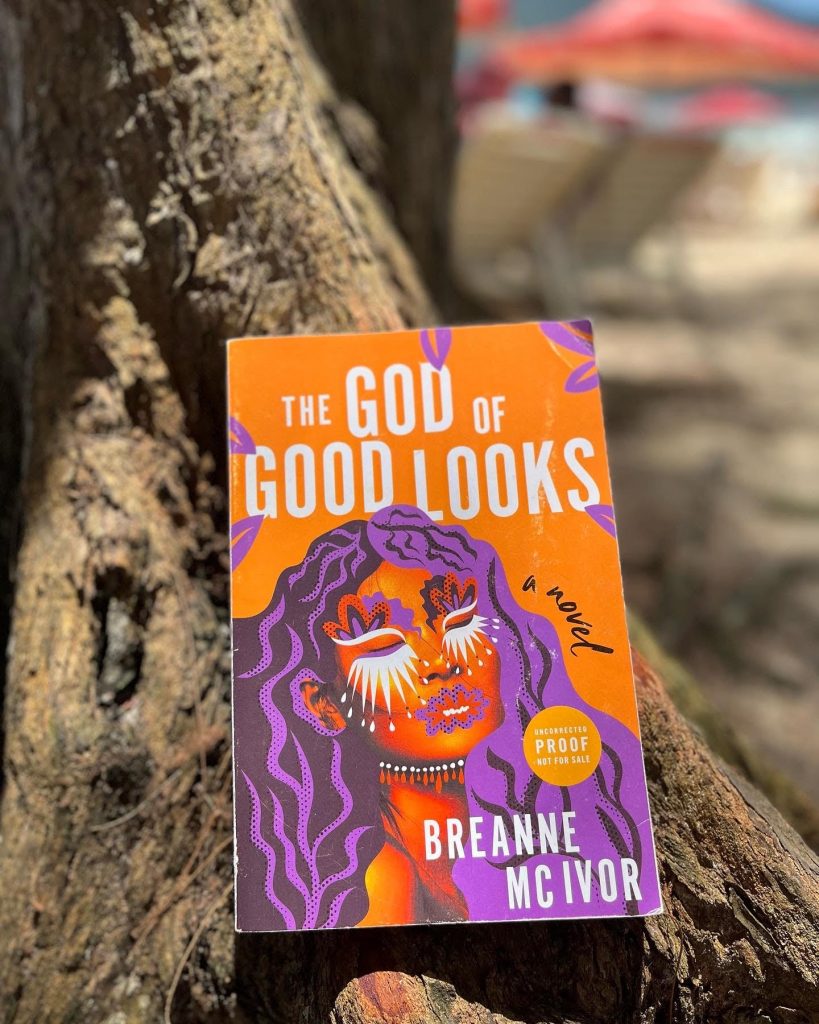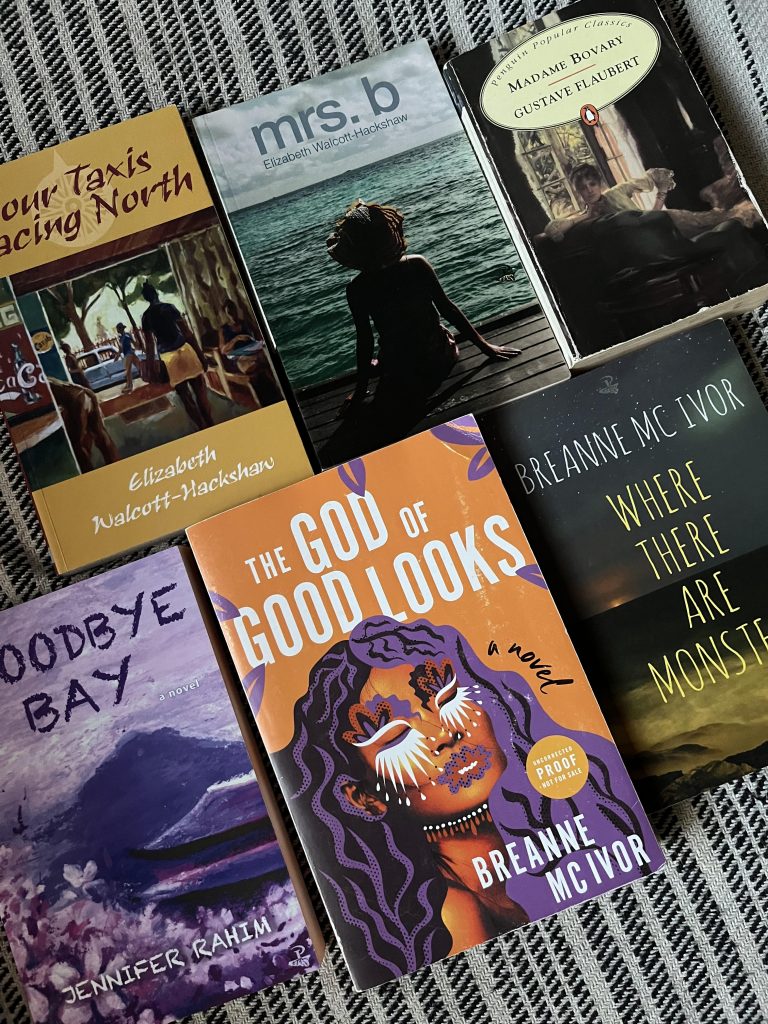The God of Good Looks, by Breanne Mc Ivor
(William Morrow, 978-0-063278-81-3, 384pp)
What do I expect from a Caribbean read?
It’s something I’ve given a lot of thought to over the past decade, figuring myself out as a writer, asking myself why I felt compelled to write in a certain vein and later, to break away from that vein. The thing is, there are certain Caribbean themes that are rightly evergreen—our bloody history, our folklore, the experience of colonialism and postcolonialism—and which we must continue to unpack in our literature. How can we not, when, as Trinidadian author Celeste Mohammed notes, we are the epicentre of trauma in the Western hemisphere. I’m not saying leave all that behind. It would be both impossible and unwise. What I’m saying is just as there is so much dark in our region, there is also so much light.
To paraphrase the painter Peter Doig, Caribbean days are split almost exactly into twelve hours of darkness and twelve hours of light (relax, meteorology enthusiasts, it’s for the purposes of a metaphor, no need to point out the sunrise and sunset times in January versus August). We are brimming with the pain of the past and present, but equally with inimitable humor, with a jollity born of rich foods, blazing sun, rolling hips, and a pure love of ole talk and bacchanal. There’s room for all of it—light and dark, old and new—on the page.
Why ignore the highly urban, millennial-run, glamour-filled side of our islands when writing the modern Caribbean? There’s a veritable well of themes, subjects, angles, and characters that are only now being explored, and often tentatively, as though veering off the beaten track might risk ridicule or rejection by the regional literati. This is precisely what makes movements like the Bookstagram-driven #ReadCaribbean movement so important: by spotlighting Caribbean books, it forces us to shine that spotlight around, seek out new voices and in so doing, discover fresh new perspectives lived first-hand by authors on the ground. One such new voice doing precisely that is Breanne Mc Ivor, whose debut novel, The God of Good Looks, flips expectations of what it means to write and read Caribbean. Let’s discuss! (Hand-clap emoji!)
The God of Good Looks, flips expectations of what it means to write and read Caribbean.
Okay, so full disclaimer: Breanne is my literary midwife and I’ll just go on and toot my own horn here and say I am hers. We read everything we write, we discuss the perspective, purpose, and strategies of our writing craft ad nauseum, and we enjoy the immense vicarious satisfaction of helping each other bring new writing into the world. If you’re a writer and you don’t have a literary midwife, find one immediately. If you’re in tech and know how to develop apps, design one that sets writers up to provide this indispensable service for one another. Think Tinder or Grindr, except you’re swapping words instead of bodily fluids. You’ll make a killing, I’m telling you. Or maybe not. What do I know? I’m a writer. I know shit-all about technology or business. What I do know is books, and Caribbean ones. So let me wrap up this tangent and get back to the matter at hand: Breanne McIvor’s debut novel and why you should read it.
Now don’t go making the cynical mistake of thinking this is some nepotistic promo scheme. The reason I was asked to write about this book is because I have had my hands deep in its innards, have palpated its organs and felt its throbbing muscular heartbeat (that’s a graphic way of saying I got to read early drafts and give feedback). I know the richness of its themes, the value of its story, and the uniqueness of its portrayal of life in Trinidad here and now in the present. I know why it was written and why it’s so important that it’s here in the world with us today, spectacular in its lush hardcover and paperback incarnations. Yet, because we live in the age of swipe-’n’-scroll, which has shortened our collective attention span, I’m opting to do this listicle style. Without further ado:
My Top Five Reasons to Read The God of Good Looks (TGOGL):
1. Toodle-oo, single C’bean story!
Tell me when last you read a novel about the beauty industry set in the Caribbean. Tell me when last you met a Trinidad-based character at the heart of the glamorous world of makeup and fashion magazines.
Yeah, that’s what I thought. Never.
The stunning breakaway from the tropes of Caribbean writing in TGOGL, in my humble(ish) opinion, is one of the strongest USPs of the book. With its catwalk-ready, yet marvelously complex characters, TGOGL peels back the Swarovski-encrusted curtain of the local glamor scene, showing readers a slice of modern Trini life never before seen in literature. Even born-and-bred Caribbean readers amply familiar with the glitzy Carnival and fashion industries might be taken aback by the premise, which only reinforces just how necessary it was for a book like this to enter our literary space.
2. The beauty, baby
If you’ve seen me out and about, perhaps on a thrilling grocery run or carrying out some other equally exciting excursion in my star-spangled working-mom life, you’ll know that I am very much le basic beetch when it comes to make-up. But even for me, TGOGL does such a phenomenal job of digging into the world of MUAs (that’s makeup artists, for those not in the know) and beauty that even the protagonist applying a basic face for work becomes utterly fascinating. You get an engrossing insight into the artistry and skill it takes to do makeup well, whether for your everyday lewk, a shocking magazine spread, or for an ultra-glam get-revenge-on-your-corrupt-government-minister-ex aesthetic. Bianca, Obadiah and the OC Beauty team make you want to dabble in their arts, the smooth, exquisitely-crafted prose sprinkled with genuinely useful tips and tricks while also raising important questions about what it means to wear make-up. Which leads me to point #3.
3. Put on your thinking cap
The best books are the ones that make you question, and TGOGL certainly does that when it comes to the themes of make-up and beauty. And what themes could be more relevant in our image-obsessed social-media-dominated society? Reading it, you’re bound to find yourself probing your relationship with make-up, regardless of whether you scorn it altogether or feel compelled to wear a Kardashian face every time you leave the house. There is no handing down of black-and-white opinions, but the characters, through their own arcs and relationships with beauty and self-worth, prompt us to examine the nuances of make-up, its value and its dangers, and the ways in which it can be used for empowerment or oppression. Considering the fact that TGOGL is also a page-turner bursting with steamy scandals and tense will-they-won’t-they romance, it’s a testament to Mc Ivor’s skill as a writer that she is able to anchor the novel in such poignant, sensitive explorations of this core theme.
4. A snapshot of home, right here and right now
Having ventured no further than the coconut-tree labyrinths of Icacos since before the pandemic, I consider myself an authority on present-day life in West Trinidad, and therefore duly qualified to declare that TGOGL’s snapshot of life in this world is certifiably accurate in relation to the specificities of her characters. The tapestry of the setting is woven with meticulous care and threads drawn from so much of Trinidadian life, from the ugly headlines to the sumptuous food. You’ll hear the rhythm of a pan section preparing for Panorama, see the sparkling nakedness of Carnival costumes, feel the antsy empty-belly energy surrounding bustling doubles vendors, and get a sense of just how much white-collar corruption and violent crime bubbles alongside the gilded world of Trinidad’s privileged high society.
If you think it’s easy to work all of that into a manuscript, well, you’ve never written a novel. It takes the observational skills of a naturist, anthropologist, gourmand, and journalist to bring as many details to setting as McIvor delivers in re-creating today’s Trinidad on the page. So for readers in the diaspora in particular, or someone who thinks people in Trinidad live in grass huts, TGOGL will transport you and give a balanced portrait of what it feels like to be on the ground here.
5. You can do eeeeet!
There are obviously lots of reasons to read TGOGL: Bianca, the down-and-out-slut-shamed protagonist you can’t help rooting for; Obadiah, the love interest you love to hate, and then just love; Eric, the corrupt villain you kinda would totally bang if you were in Bianca’s shoes; the rich themes; the vivid setting; the gripping prose. But my final reason to grab your copy isn’t about what’s in the book, it’s the book itself.
The very existence of TGOGL out on the international stage, published by William Morrow (HarperCollins) and Penguin Fig Tree, sends a message. Scratch that. It ROARS a message to every person living in a small island on the periphery of the Big Bad First World, the people who think that because of where they’re from, they can’t write a ‘big book’ or have a viable career as an author.
If you think it’s easy to work all of that into a manuscript, well, you’ve never written a novel. It takes the observational skills of a naturist, anthropologist, gourmand, and journalist to bring as many details to setting as McIvor delivers in re-creating today’s Trinidad on the page.
People: you can. TGOGL is proof that we writers based in the Caribbean can overcome the hurdle of our location. No, we can’t network and schmooze at book fairs and conferences, we can’t do signings or book tours without racking up serious expenses, and it’s a whole lot harder for us to gain access to the live-action publishing scene. But that doesn’t mean we can’t get ourselves, and our work, out there. Also, here’s some insider scoop for you, this book was written while the author worked a demanding nine-to-five corporate job, during the wee hours before waking up for a gruelling day at work. It’s a testament to dedication, passion, and getting your writing done no matter what obstacles are in your way.
Which is why I have to wrap up now. My own little writing obstacles, whom I cherish with all my heart and trust to show me nothing but the purest filial devotion after all the selfless motherly work I do for them (just in case they’re reading this years from now), are beckoning me away from my desk. It’s time to embark on another hour of dinosaurs, diapers, and meltdowns over minutiae, the stuff of dreams.
When they finally go to bed, I’ll be using that blessed moment of solitude to “sip” a vodka-tonic, listen to the pattering of rain on balisier leaves, swat a few blood-heavy mosquitoes, and pick up a good Caribbean book. I hope you will too, and I hope that book will be The God of Good Looks, shattering your expectation of what it means to read and write Caribbean.
∞
Caroline Mackenzie is a writer and translator living in Trinidad. Her sensational debut novel, One Year of Ugly, was published in 2020 by Borough Press.


